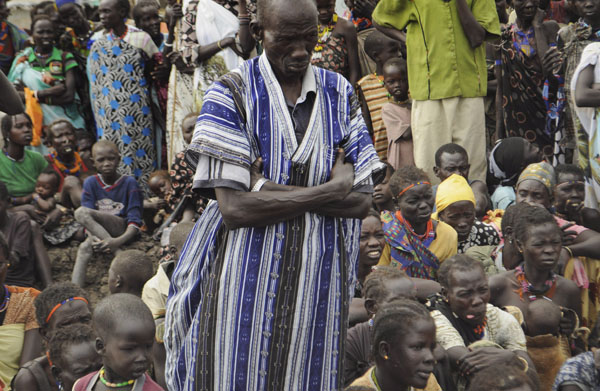
JUBA, South Sudan and NAIROBI, Kenya — Violence has sharply decreased between warring groups in the volatile state of Jonglei, according to the governor. Speaking at a press conference during a visit to the state capital by the top United Nations official in South Sudan, Governor Kuol Manyang attributed the calm to the success of the government’s disarmament campaign and ongoing peace talks.
Whether this positive trend will last depends on the factors driving the apparent decline in intercommunal clashes, and even those who commend the government’s effort say many of the underlying causes for the violence are yet to be addressed.
Following a large-scale Lou Nuer attack in December of last year and subsequent Murle counter-attacks early this year, the South Sudan government has taken two major steps toward stabilizing relations between Jonglei’s communities. In mid-March, the government initiated a disarmament campaign as a means of mitigating further violence. Six weeks later the government convened a peace conference in the capital of Bor that drew together community and government representatives from the six communities in Jonglei.
The conference marked an important first step in what will be a long reconciliation process, but some observers faulted the gathering for not being inclusive enough of the main instigators of recent violence—the youth militias. On the side of the Lou Nuer, three of the six White Army leaders were present, but the group’s top leader, Bor Doang, was not. He is reported to have left Jonglei state to avoid disarmament. Further, the rural Murle cattle-keeping youth were also not represented, raising fears among international observers that key stakeholders for building peace in Jonglei remain outside of the process.
Government access to armed youth has proven similarly difficult during the disarmament campaign. A significant number of Murle and Lou Nuer armed youth are thought to have fled over the border to Ethiopia, neighboring states, or to be biding their time in remote parts of the state to avoid the SPLA’s disarmament campaign. The heavy presence of SPLA soldiers has compelled militia members to lie low, suggesting that the threat they pose has simply been diverted for the moment, not defused.
Sarah Nyakuoth, a member of Parliament representing the Fangak area of Jonglei, told the Enough Project that the Murle fighters who have fled or are hiding present a significant unknown, even as the peace process proceeds. “No bad incidents have happened since the peace conference, but we don’t know what will happen when the fighters try to come back,” she said. “The army is waiting for them.”
But the army’s own involvement in efforts to quell tensions in the region has been rife with controversy. Alarming reports have emerged of abuses committed by government forces during the disarmament campaign, including the use of torture, rape, beatings, harassment, and the destruction of civilian property as means of forcing civilians to give up arms. Enough Project sources said that the ongoing disarmament process has thus far unfolded more peacefully than previous attempts. Attendees of the Bor peace conference appeared to broadly support the disarmament process, pledging support for the campaign in the conference’s resolutions. But the allegations of abuses committed against civilians point to a troubling security environment at a time when the government should be seeking to build the trust of the communities who have disarmed. The government has made some initial efforts to hold soldiers accused of abuses accountable, but a full investigation into the crimes documented and alleged by groups present in the region is needed, as is continued monitoring of the ongoing process by the U.N., NGOs, civil society, and the government.
Going forward, confidence in government security forces, which will hinge on whether the army and police can provide protection for disarmed civilians from potential attacks, will be important for ensuring civilians are not compelled to re-arm or take violent measures as a means of self-defense.
Whether meaningful implementation of the peace plan generated at the conference takes place will also be a key test of the government’s commitment to addressing inter-communal violence in the state. And beyond the provisions of the peace plan, Jonglei residents will need to see how “learning about peace” translates into a meaningful improvements in their lives, Nyakuoth said. Funds for longer-term development projects—like primary and secondary schools or agricultural and vocational training—can be difficult to come by, she said. But they are a necessary investment. “If there are these types of activities people will forget about going for revenge.”
Photo: Displaced Jonglei residents await food rations (AP)

